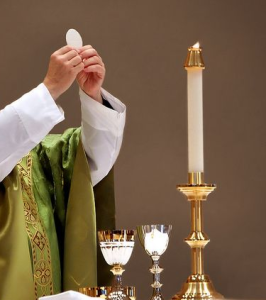The largest religious system of idolatry in the world, when one views it through human eyes, seems to have a lot of dignity, devotion, pomp and circumstance. A lot of it’s ideas are romanticized (with the stress on the “roman” part of that word) and can easily dupe those who lack spiritual discernment into thinking that what they teach is spiritual truth, especially when they have their own counterfeit version of the Bible. However, when one compares it to the ultimate spiritual truth–God’s true word–it is really full of lies, deceptions, and cover-ups. Take for instance, the Roman Catholic Church (RCC) teaching on transubstantiation.
What’s transubstantiation?
 Transubstantiation, according to Catechism 1376, is the doctrine that all ordained priests in the RCC have the power to turn the Eucharist bread and wine into the actual body and blood of Jesus Christ, despite the fact the bread and wine still carry the properties of bread and wine when consumed. Partaking of the actual body and blood of Jesus (in their minds) is one of several ways to obtain salvation by human effort.
Transubstantiation, according to Catechism 1376, is the doctrine that all ordained priests in the RCC have the power to turn the Eucharist bread and wine into the actual body and blood of Jesus Christ, despite the fact the bread and wine still carry the properties of bread and wine when consumed. Partaking of the actual body and blood of Jesus (in their minds) is one of several ways to obtain salvation by human effort.
They base this doctrine on what Jesus said in John 6:32-58, where he stated no one could be saved unless they ate his flesh and drank his blood. Although the RCC foolishly takes this literally, Jesus himself revealed in John 6:63 that those words he spoke in this passage were to be taken figuratively as spiritually symbolic, not literal.
Reasons to reject transubstantiation
1. Jesus himself, and later Paul by the Holy Spirit, said the Eucharist (Communion) was to be done as a memorial to Christ’s completed work on the cross where he died for our sins (Luke 22:19-20; 1 Corinthians 11:23-36).
2. Transubstantiation promotes the false idea that Christ’s sacrifice on Calvary’s cross was insufficient, so he has to be sacrificed over and over again to make atonement for us–which is the same thing Old Testament priests did. However, Hebrews 7:27 says Jesus “needeth not daily, as those high priests, to offer up sacrifice, first for his own sins, and then for the people’s: for this he did once, when he offered up himself.” Hebrews 10:9, 10, 12 goes on to say the following:
Then said he, Lo, I come to do thy will, O God. He taketh away the first, that he may establish the second.
By the which will we are sanctified through the offering of the body of Jesus Christ once for all…
But this man, after he had offered one sacrifice for sins for ever, sat down on the right hand of God;
Christ’s sacrifice was so powerful that once was enough to cover everyone who lived in the past to everyone who will live in the future based on their faith alone. He didn’t have to repeat it.
3. Transubstantiation implies that a believer doesn’t have eternal security. Since, according to this false teaching, Christ’s sacrifice wasn’t sufficient enough to be done once for salvation, it can’t possibly keep us saved. Between the moments we partake of the Eucharist, we can lose our salvation, so the Eucharist must be taken over and over to make sure we regain salvation. But God’s word equates salvation with eternal life and everlasting life, which means that once you have it, it never ends. Jesus even said “no man” can pluck a believer out of his hand (John 10:28-29) and in John 6:37 he states he will “in no wise” cast them out. They will not be thrown out by him under any circumstances.
4. This doctrine teaches salvation by works. If one does the Eucharist, one can be saved for participating in the Eucharist because it’s Jesus’ actual body and blood. But Ephesians 2:8-9 and the whole New Testament teaches we can only be saved by God’s grace through faith in Christ alone, not by religious works or any other works.
Conclusion
The teaching of transubstantiation is clearly a violation of God’s word and of his nature as reflected in his beautiful work of Christ’s sacrifice for our salvation. That’s why it should be considered false doctrine and those who espouse it are deceived deceivers.
























Good post, very important subject! I’m not sure who the priests call upon to make this physical change from ‘bread & wine’ to ‘body & blood’ but to me it strongly resembles witchcraft. Sad to say, it is nothing short of conjuring supernatural power to perform magic.
LikeLiked by 1 person